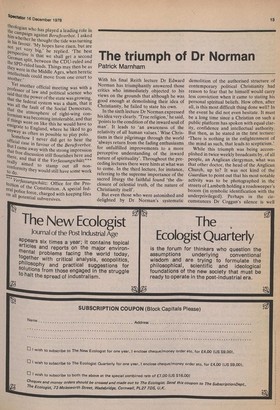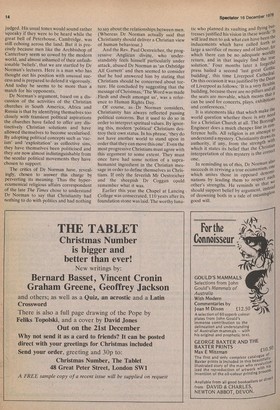The triumph of Dr Norman
Patrick Marn ham
With his final Reith lecture Dr Edward Norman has triumphantly answered those critics who immediately objected to his views on the grounds that although he was good enough at demolishing their idea of Christianity, he failed to state his own.
In the sixth lecture Dr Norman expressed his idea very clearly. 'True religion,' he said, 'points to the condition of the inward soul of man'. It leads to 'an awareness of the relativity of all human values.' Wise Christians in their pilgrimage through the world 'always return from the fading enthusiasms for unfulfilled improvements to a more perceptive understanding of the inward nature of spirituality'. Throughout the preceding lectures there were hints at what was to come. In the third lecture, for instance, referring to the supreme importance of the sacred liturgy the faithful found 'the disclosure of celestial truth, of the nature of Christianity itself.
But even those who were astonished and delighted by Dr Norman's systematic demolition of the authorised structure of contemporary political Christianity had reason to fear that he himself would carry less conviction when it came to stating his personal spiritual beliefs. How often, after all, is this most difficult thing done well? In the event he did not even hesitate. It must be a long time since a Christian on such a public platform has spoken with equal clarity, confidence and intellectual authority. But then, as he stated in the first lecture: 'There is nothing in the enlightenment of the mind as such, that leads to scepticism.'
While this triumph was being accomplished in twice weekly broadcasts by, of all people, an Anglican clergyman, what was that other doctor, the head of the Anglican Church, up to? It was not kind of the Guardian to point out that his most notable activity was to be photographed in the streets of Lambeth holding a roadsweeper's broom (in symbolic identification with the underprivileged). Perhaps in the circumstances Dr Coggan's silence is well judged. His usual tones would sound rather squeaky if they were to be heard while the great bell of Peterhouse, Cambridge, was still echoing across the land. But it is precisely because men like the Archbishop of Canterbury seem so cowed by the modem world, and almost ashamed of their unfashionable 'beliefs', that we are startled by Dr Norman's lectures. Here is a man who has thought out his position with unusual success and is prepared to defend it vigorously. And today he seems to be more than a match for his 'opponents.
Dr Norman's argument, based on a discussion of the activities of the Christian churches in South America, Africa and Russia is that by identifying themselves too • closely with transient political aspirations • the churches have failed to offer any distinctively Christian solutions and have allowed themselves to become secularised. By adopting political concepts such as 'racism' and 'exploitation' as collective sins, they have themselves been politicised and they are now almost indistinguishable from the secular political movements they have chosen to support.
The critics of Dr Norman have, revealingly, chosen to answer this charge by perverting its meaning. Thus the hyperecumenical religious affairs correspondent of the late The Times chose to understand Dr Norman to say that Christianity had nothing to do with politics and had nothing to say about the relationships between men. (Whereas Dr Norman actually said that Christianity should deliver a Christian view of human behaviour.) And the Rev. Paul Oestreicher, the progressive Anglican divine, who understandably feels himself particularly under attack, abused Dr Norman as 'an Oxbridge Alf Garnett' and then seemed to consider that he had answered him by stating that Christians should be concerned about torture. He concluded by suggesting that the message of Christmas, 'The Word was made Flesh and dwelt amongst us', was a reference to Human Rights Day.
Of course, as Dr Norman considers, Christianity has always reflected passing political concerns. But it used to do so in order to interpret spiritual values. By ignoring this, modern 'political' Christians destroy their own status. In his phrase, 'they do not have another world to stand upon in order that they can move this one'. Even the most progressive Christians must agree with this argument to some extent. They must once have had some notion of a suprahumanist ingredient in the Christian message in order to define themselves as Christians. If only the feverish Mr Oestreicher and the sheepish Dr Coggan could remember what it was.
Earlier this year the Chapel at Lancing College was consecrated, 110 years after its foundation stone was laid. The worthy luna tic who planned its vaulting and flying buttresses justified his vision in these words: 'It will lead men to ask what can have been the inducements which have called forth sa large a sacrifice of money and of labour, for which there can be no adequate worldlY return, and in that inquiry find the rile, solution.' Four months later a forgetful press hailed a second 'last great Gothic building', this time Liverpool Cathedral' On this occasion it was justified by the Dean of Liverpool as follows: 'It is a very flexi,h,le, building, because there are no pillars ana 41." the seats are movable, which means that it can be used for concerts, plays, exhibitions and conferences.' It is statements like that which make the world question whether there is any nee, for a Christian Church at all. The Bornug" Engineer does a much cheaper line in °IIference halls. All religion is an attemPt understand a mystery. Christianity draws "s authority, if any, from the strength With which it states its belief that the Christiant interpretation of this mystery is the'earree one. In reminding us of this, Dr Norman al° succeeds in reviving a true ecumenign, an.e which unites those in opposed dem:3101 nations by leading them to respect en other's strengths. He reminds us that vie, should support belief by argument, instead of drowning both in a tide of meaningless good will.



































 Previous page
Previous page